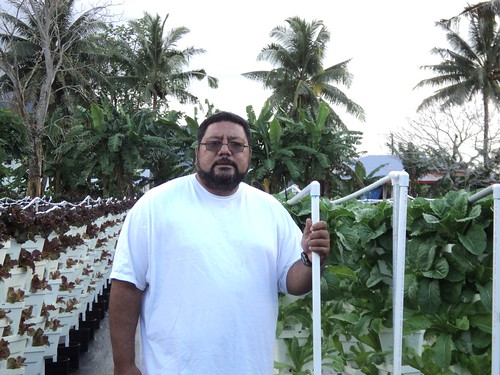
Edward Avegalio fought for his country in Operation Desert Shield in the early 1990s. Today, he serves his country by providing locally grown, fresh produce to area schools, local restaurants and stores through the first hydroponic farm in American Samoa that was redesigned to allow him to actively work the land.
"I am a strong advocate of food security,” said Avegalio. “I believe in investing in agricultural practices that work, and I believe that as members of the global community we can all make small efforts to invest in ourselves by growing small gardens to help increase awareness and build back some of our self sufficiency.”
After enduring months of rehabilitation from injuries suffered during his military service, Avegalia returned to his home in Pavaiai. It was during that time that he decided his future would be to continue the tradition of working the family farm, but he would need to transform the 0.9 acre plot of land to accommodate his needs.
War injuries left Avegalio using a cane and unable to walk great distances. The farm is on a slight slope, making it difficult for him to be a part of the operation without assistance. Assistance from the American Samoa Department of Vocational Rehabilitation and Veterans Affairs Vocational Rehabilitation, transformed the land into an accessible haven where Avegalio could participate in the daily operation and management of the family farming business.
With the farm now accessible, a loan from the Farm Service Agency gave Avegalio access to credit needed to create a hydroponic operation that incorporates a vertical stack method, increasing the farm’s acreage while providing Avegalio with accessibility.
Hydroponics served an advantage by not requiring as much square footage while producing as if the farm was double its size, which is important on an island that is only 76 square miles.
Avegalio Farm Pavaiai is a diversified operation known throughout the island for its Tahitian papayas and limes. The hydroponics system now produces romaine lettuce, tomatoes, cilantro, basil, parsley and chives. While most of their lettuce is sold to the school lunch program, local restaurants and stores, the family still maintains a small road side stand in honor of the humble beginnings as a small family operation.
Avegalio is an advocate for agriculture and consistently encourages community members to get involved. “It's time for us all to ‘farm boy up’ and get dirty experimenting with what kinds of crops we can each contribute for personal use. If we each foster this attitude, just imagine," he said.
On May 23, USDA announced a new proposed microloan program that will provide up to $35,000 in start-up capital targeted to small and beginning farmers and ranchers. The program aims to help these operations progress through their start-up years with needed resources, while building capacity, increasing equity and eventually graduating to commercial credit. The microloan program is an especially important entry point for veterans and other beginning farmers. . To learn more, click here.
